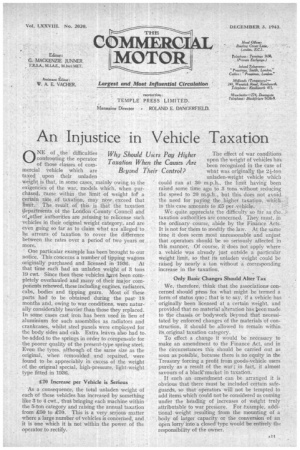An Injustice in Vehicle Taxation
Page 13

If you've noticed an error in this article please click here to report it so we can fix it.
0 NE of „the difficulties confronting the operator of those classes of commercial vehicle which are taxed upon their unladen weight is that, in some cases, mainly owing to the exigencies of the war, models which, when purchased, came within the limit of weight fof a certain rate of taxation, may now exceed that limit. The result of this is that the taxation departments of the London County Council and ot„other authorities are refusing to relicense such vehicles in their original weight category, and are even going so far as to claim what are alleged to be arrears of taxation to cover the difference between the rates over a period of two years or more.
One particular example has been brought to our notice. This concerns a number of tipping wagons ,originally purchased and licensed in 1936. At that time each had an unladen weight of 3 tons 19 cwt. Since then these vehicles have been completely overhauled and many of their major components renewed, these including engines, radiators. cabs, bodies and tipping gears. Most Of these parts had to be obtained during the past. 18 months and, owing to war conditions, were naturally considerably heavier than those they replaced. In some cases cast iron has been used in lieu of aluminium for such assemblies as radiators and crankcases, whilst steel panels were employed for the body sides and cab. Extra leaves also had to. be added. to the springs in order to compensate for the poorer quality of the present-type spring steel,. Even the tyres, although of the same size as the original, when remoulded and repaired, were found to be appreciably in excess of the weight of. the original special, high-pressure, light-weight type fitted in 1936.
£20 Increase per Vehicle is Serious As a consequence, the total unladen weight of each of these vehicles has increased by something like 3 to 4 cwt., thuS bringing each machine within the 5-ton category and raising the annual taxation from £50 to £70. This is a very serious matter where a large number of vehicles is concerned, and it is one which it is not within the power of the operator to rectify. The effect of War conditions upon the weight of vehicles has been recognized in the case of Control? what was originally the 2-ton unladen-weight vehicle which could run at 30, m.p.h., the limit having been raised some time ago to 3 tens without reducing the speed to 20 m.p.h., but this does not avoid. the need for paying the higher taxation, which in this.case amounts to £5 per -vehicle.
We quite appreciate the difficulty so far as the taxation authorities are concerned. They must, in the ordinarycourse, abide by the Finance Acts. . It is not for them to modify the law. At the same time it does seem most unreasonable and unjust that .operators should be so seriously affected in this manner. Of course, it does not apply where a vehicle was already just outside a particular weight limit, so that its unladen weight could be raised by nearly a ton without a corresponding increase in the taxation.
Only Basic Change's Should Alter Tax We, therefore, think that the associationsconcerned should press for what might be termed a form of status quo ; that is te say, if a vehicle has originally been licensed at a certain weight, and provided that no material alteration has been made to the chassis or bodywork beyond that necessitated by enforced changes of the materials of construction, it should be allowed to remain within its original taxation category.
To effect a change it would be necessary to make an amendment to the Finance Act, and in the circumstances this should be carried out as soon as possible, because there is no equity in the Treasury forcing a profit from goods-vehicle users purely as a result of the war ; in fact, it almost savours of a black'market in taxation.
If such an amendment can be arranged it is obvious that there must be included certain safeguards, so that operators will not be tempted to add items which could not be considered as coming under the heading of increases of weight truly attributable to war pressure. For example, additional weight resulting from the mounting of a body of larger capacity or the conversion of an open lorry into a closed type would be entirely the responsibility of the owner.




















































